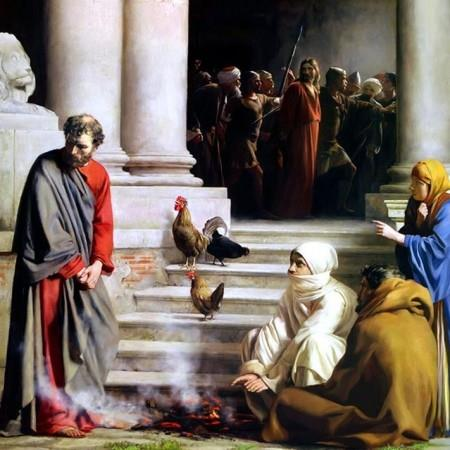Luke 22
Peter’s denial
Luke 22
55 And when they had lit a fire in the midst of the courtyard, and had sat down
together, Peter sat in the midst of them.
56 But a certain maid, seeing him as he sat by the light, and gazing at him, said, This man
was also with Him.
57 And he denied Him, saying, Woman, I do not know Him.
58 And after a very little while another, seeing him, declared, Thou art also of them; but
Peter said, Man, I am not.
59 And about one hour intervening, another strongly affirmed, saying, On the truth,
this man also was with Him, for he also is a Galilean.
60 And Peter said, Man, I do not know what thou sayest. And immediately, while he
yet spoke, the cock crowed.
61 And the Lord turning looked at Peter. And Peter remembered the word of the Lord,
when He had said to him, Before the cock crows, thou shalt deny Me three times.
62 And Peter went out and wept bitterly.
AC 6073:3e. ...That faith [separated from charity] would reject the Lord is evident from the representation by Peter, by whom was represented faith, when he denied Him three times. That he did this at night signifies the last time of the church, when there is no longer any charity.... That he did it three times signifies that this condition is then complete.... That it was before the cock crowed signifies before newness of the church would arise, for the twilight and morning which follow the night signify the first of the church....
AC 2689. ... “Lifting up the voice and weeping” [signifies] the last degree of grief; for weeping with a loud voice is nothing else. The state of desolation of truth, and also of removal from truths, with those who are becoming spiritual, is described....
Those who cannot be reformed do not at all know what it is to grieve on account of being deprived of truths; for they suppose that no one can feel in the least anxious about such a thing. The only anxiety they believe to be possible is on account of being deprived of the goods of the body and the world; such as health, honors, reputation, wealth, and life. But they who can be reformed believe altogether differently: these are kept by the Lord in the affection of good and in the thought of truth; and therefore they come into anxiety when deprived of this thought and affection.
AC 2689:2. ...Everyone’s life is nothing but affection or love. Hence it is evident what is the state of those who are desolated as to the goods and truths with which they are affected, or which they love, namely, that their state of grief is more severe, because more internal; and in the deprivation of good and truth they do not regard the death of the body, for which they do not care, but eternal death....
AC 2689:3. That it may be known who those are that can be kept by the Lord in the affection of good and truth, and thus be reformed and become spiritual, and who those are that cannot, we will briefly state that during childhood, while being for the first time imbued with goods and truths, everyone is kept by the Lord in the affirmative idea that what he is told and taught by his parents and teachers is true. With those who can become spiritual men this affirmative is confirmed by means of knowledges [scientifica et cognitiones]; for whatever they afterwards learn that has an affinity with it, insinuates itself into this affirmative, and corroborates it; and this more and more, even to affection. These are they who become spiritual men in accordance with the essence of the truth in which they have faith, and who conquer in temptations....
But it is otherwise with those who cannot become spiritual men.... The real cause of their admitting doubts and afterwards denials is to be found in their life of evil....
AE 484:3. It is to be noted, that both “shedding tears” and “weeping” signify grief on account of falsities and from falsities, but “shedding tears” grief of mind, and “weeping” grief of heart, on account of falsities. Grief of mind is grief of the thought and understanding, which pertain to truth, and grief of heart is grief of the affection or will, which pertain to good.... That “weeping” means grief of heart can be seen from the fact that “weeping” bursts forth from the heart and breaks out into lamentations through the mouth. And that “shedding tears” is grief of mind can be seen from this, that it issues forth from the thought through the eyes. In both weeping and in the shedding of tears, water comes forth which is bitter and astringent, and this occurs through an influx into man’s grief from the spiritual world, where bitter water corresponds to the lack of truth because of falsities, and to consequent grief; therefore those who are in truths grieve on account of falsities.
Questions and Comments
- Why does separation of faith from charity lead to denial of the Lord?
- The cock crowing reminded Peter of his promise to the Lord, and how he had failed to keep it. The cock crowing was a sign of the coming of the morning, which represents the new church. Does the Heavenly Doctrine point out the failure of the former church? In what spirit?
- In what sense should we not care about the death of the body, but about eternal death?
- What are some falsities over which Peter might have grieved?
| previous |  |
next |
|---|


